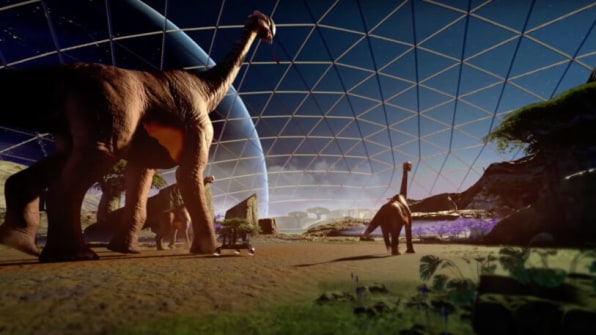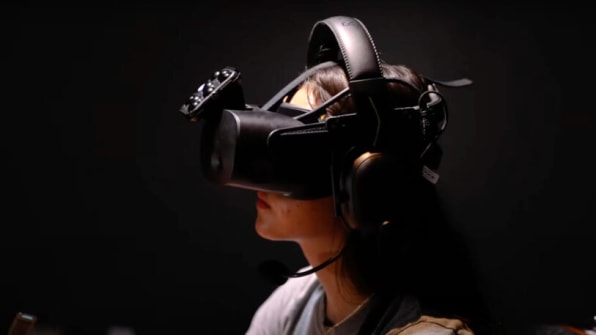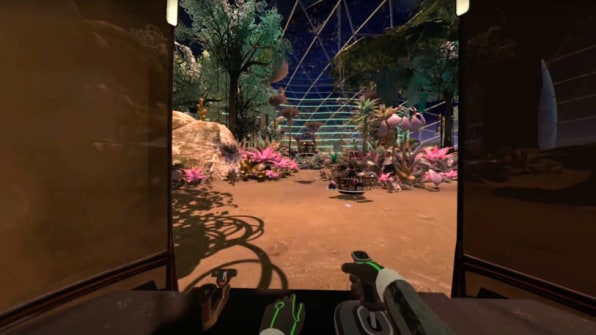For students taking biology at Arizona State University, their first lab experiences are likely to involve extraterrestrial life.
The university has ditched traditional intro bio labs—the kinds where students learn to use a pipette or dissect an animal—in favor of a virtual reality experience set in a VR wildlife sanctuary for alien beings. It’s part of a partnership between ASU and VR entertainment company Dreamscape Immersive, cofounded by Men in Black producer Walter Parkes, that the university says has boosted student performance in biology, including by members of groups historically underrepresented in higher ed.
The collaboration, called Dreamscape Learn, came after ASU President Michael Crow visited one of Dreamscape Immersive’s entertainment centers and was struck by the company’s Alien Zoo experience. As the university and the VR producers began to work together, Parkes says they found that the three-act structure familiar to moviegoing audiences also naturally suited teaching students about science.
“That cadence of the three acts at the beginning, the middle, and end actually fits very beautifully over science and exploration, as in the discovery of a problem, the analysis of a problem, and then some kind of resolution to the problem, whether or not you’re right,” Parkes says.

Naturally, the lessons students learn about the behavior, genetics, and other aspects of the fictional creatures also apply to their studies of real-world life. Since most students don’t go on to major in biology, the program also emphasizes general lessons in problem-solving and data analysis that apply to other challenges they’re likely to face in school and careers.
“The curriculum focuses around quantitative reasoning, problem-solving, metacognition, communication, teamwork, which should really serve any student,” says John VandenBrooks, associate dean for immersive learning at ASU.

For each section of the course, students typically make a first trip into VR, entering the alien world in a specialized, on-campus motion capture environment. (Students pay the same lab fee they would pay in a traditional bio class, with the funds going to pay for the VR experience rather than real-world materials). There, they gather data and make observations, which they’ll analyze on a traditional computer using tools like Excel. They formulate hypotheses about how to solve an in-world problem, like figuring out why a virtual animal is failing to thrive, and ultimately return to VR to test their theories out. Using the game-like environment lets students explore scenarios and conduct experiments it wouldn’t be possible to have them conduct in the real world.

“We basically had to do a complete medical diagnosis of the situation—it could be anything from the climate, to the opposite, like the animal’s heartbeat,” recalls Abhinav Ranish, an ASU sophomore who recently completed the VR-powered bio course. “So that was very fascinating, because it kind of took us to the medical process, which an actual doctor or veterinarian might go through without actually having to have the complete knowledge of doing it.”
The immersive experiences also help to keep students tuned in, a challenging task in a time of electronic distractions. “We’ve never seen somebody check their cellphone while they were in headset,” says Dreamscape Learn CEO Josh Reibel.
Dreamscape Learn and ASU plans to continue to learn how students fare after they complete the VR-powered course, which more than 12,000 students have taken so far. There are also more in the works for other subjects, including a chemistry course set in a VR experience Parkes compares to “Mission: Impossible for eggheads,” where students serve as members of an elite team virtually dispatched to solve scientific problems. A course focusing on art and history, as well as an astronomy course, are also under development. The program is also expanding to other institutions, with Glendale Community College in California announcing in November it’s harnessing a state grant to fund the program, which will be housed in a new VR center.
Reibel says the team is also working on versions of the experiences that can run on commercial VR hardware rather than on a dedicated soundstage. That should make it possible to expand to still-more schools, including K-12 classrooms, he says, which can also benefit from the engaging coursework.
But, Reibel and others emphasize, while the VR material may indeed be more fun than a traditional bio lab session, the data-driven course it supports isn’t intended to be any less rigorous than one that involves dissecting frogs instead of monitoring simulated aliens.
“It’s not that the immersive media takes students away from the hard work of traditional studying and mastering hard concepts,” he says. “It’s that it propels them into it.”
Login to add comment
Other posts in this group

AI usage has been deemed by some to be an inevitablity. Many recent he


China has been expanding the use of digital currencies as it promotes wider use of its yuan, or renminbi, to reflect its status as the world’s second-largest economy and challenge the overwh

Welcome to AI Decoded, Fast Company’s weekly newsletter that breaks down the most imp

Ever wonder how much energy it takes when you ask an AI to draft an em

It’s one of the great questions of our modern age: How does Sweetgreen lose money selling $14 (and up!) fast casual salads and bowls? And not just a little money but $442 million in the last three

Throughout 2023, the Biden administration persuaded a group of AI comp
